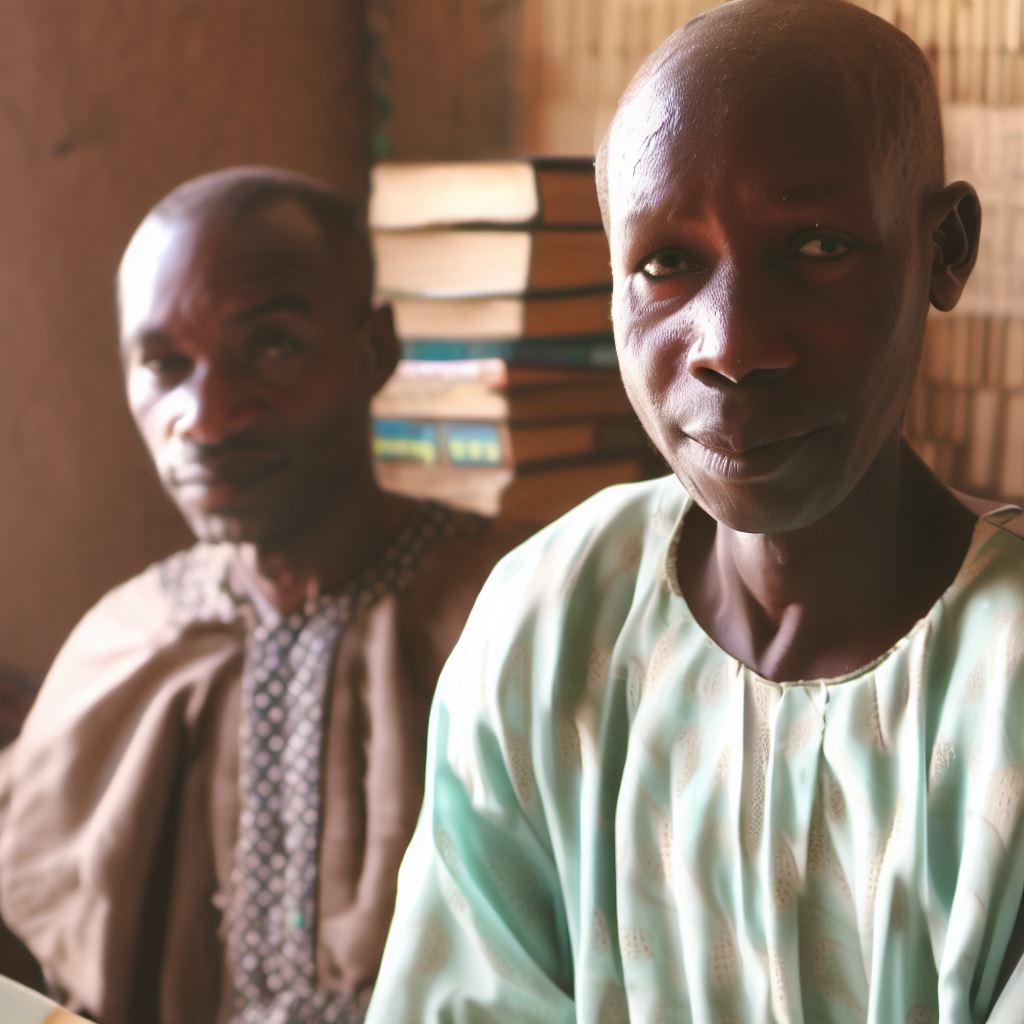Introduction
Rural libraries play a crucial role in Nigeria by providing access to knowledge and resources in remote areas. These libraries serve as hubs for education, information, and community development.
The impact of librarians in these rural libraries cannot be overstated, as they are the driving force behind their success.
Librarians in rural Nigeria are tasked with not only managing the library but also with cultivating a love for reading and learning among the community members.
They serve as educators, mentors, and guides, providing valuable assistance to individuals who may not have access to formal education.
The librarian’s impact is felt in various ways. Firstly, they ensure that the library collections are diverse, relevant, and up-to-date, catering to the needs and interests of the community.
Secondly, they organize engaging programs and events that promote literacy, such as storytelling sessions and book clubs. These activities stimulate a love for reading and help develop critical thinking skills.
Furthermore, librarians act as intermediaries between the library users and technology, bridging the digital divide by providing access to computers, the internet, and digital tools.
They help individuals navigate these resources, empowering them with digital literacy skills.
In addition to their immediate impact, librarians in rural Nigeria also contribute to long-term development.
By instilling a passion for knowledge, they inspire children and adults alike to pursue education and personal growth, potentially breaking the cycle of poverty and ignorance in these communities.
Overall, rural libraries and the librarians who run them are essential in Nigeria. They bring education, information, and opportunity to underserved areas, transforming lives and communities.
In the following sections, we will delve deeper into the specific contributions and challenges faced by these dedicated librarians.
Challenges Faced by Rural Libraries in Nigeria
Rural libraries in Nigeria encounter challenges that hamper their effectiveness and impact:
- Limited access to resources and technology restricts educational opportunities for users.
- Lack of funding and infrastructure impedes facility maintenance and service quality.
- Low literacy rates in rural areas diminish demand for library services and investment.
These issues collectively undermine the vital role rural libraries play in their communities.
- Inadequate resources, including books and internet access, hinder knowledge acquisition.
- Limited funds lead to outdated equipment and poorly maintained facilities, reducing service quality.
- Low literacy rates deter investment, perpetuating the cycle of limited resources and services.
The absence of technology access inhibits users’ ability to acquire digital skills, hampering personal and academic growth.
- Inadequate funding further exacerbates challenges, preventing facility maintenance and technology upgrades.
- Outdated infrastructure limits libraries’ capacity to serve communities effectively.
Addressing these challenges requires concerted efforts from government, stakeholders, and communities to prioritize rural library infrastructure, financial support, and literacy programs.
In short, rural libraries in Nigeria face a complex web of challenges.
By tackling these issues collectively, rural libraries can fulfill their vital role in promoting education, knowledge, and community development.
Read: Key Skills for a Photonics Specialist in Nigeria
Role of the Librarian in Rural Libraries
In rural Nigerian libraries, librarians serve as knowledge gatekeepers, learning facilitators, and community catalysts.
Their key responsibilities include:
- Access to Information: They curate, organize, and ensure community access to diverse information and resources.
- Promoting Literacy and Education: Librarians actively advocate literacy, organize reading programs, and collaborate with local schools.
- Fostering Community Engagement and Development: They arrange events, workshops, and seminars to address community needs and enhance cultural awareness.
- Bridging the Digital Divide: Librarians provide crucial internet access and assist users in navigating online resources.
- Information Literacy: They teach users how to evaluate information critically, differentiate reliable sources, and make informed decisions.
- Educational Support: Librarians assist with research, computer skills, and lifelong learning, aiding students and individuals.
- Community Leadership: They collaborate with organizations to bring resources and services that promote economic development, health, and social integration.
- Advocacy: Librarians actively advocate for improved resources and infrastructure, securing funding for enhancements tailored to community needs.
Basically, rural Nigerian librarians are pivotal in enhancing the quality of life in their communities by facilitating knowledge access, literacy, education, digital inclusion, and community development.
Read: How to Start in Photonics: A Guide for Nigerians
Impact of Librarians in Rural Communities
A. Increased Literacy Rates and Educational Opportunities
- Librarians play a crucial role in improving literacy rates in rural communities.
- They provide access to a wide range of educational resources, including books, magazines, and online materials.
- Librarians actively promote reading habits and organize reading programs to instill a love for learning among individuals.
- By offering educational opportunities, librarians empower rural residents to acquire knowledge and improve their skills.
- Libraries act as hubs for educational support, helping individuals with academic research and providing guidance for further education and career development.
B. Empowering Individuals in Rural Areas
- Librarians act as mentors and guides, assisting individuals in accessing information and gaining knowledge.
- They help bridge the digital divide by teaching digital literacy skills and providing access to computers and internet.
- Librarians empower individuals to become active participants in their own education and personal growth.
- Through library programs and workshops, they enable individuals to enhance their skills, explore new interests, and pursue their passions.
- By promoting lifelong learning, librarians empower rural residents to become knowledgeable, confident, and self-reliant individuals.
C. Strengthening Community Development and Cohesion
- Librarians play a vital role in fostering community development in rural areas.
- They create a safe and welcoming environment where community members can gather, learn, and engage with one another.
- Libraries often serve as meeting spaces, hosting community events, workshops, and cultural activities.
- Librarians actively collaborate with local schools, community organizations, and government agencies.
- They facilitate partnerships and initiatives that address community needs, promote social inclusion, and improve the overall quality of life in rural areas.
Essentially, librarians have a significant impact on rural communities in Nigeria.
They contribute to increased literacy rates and educational opportunities, empowering individuals to enhance their skills and knowledge.
Moreover, librarians play a crucial role in strengthening community development and fostering social cohesion.
Through their dedication and efforts, they bring positive change to the lives of rural residents, making libraries essential institutions in these areas.
Read: Challenges in Photonics: A Nigerian Perspective

Case Studies of Successful Librarian Initiatives in Rural Nigeria
Case Studies of Successful Librarian Initiatives in Rural Nigeria:
- Storytelling Sessions and Reading Clubs: Librarians organize these activities, igniting a passion for reading among children.
- Mobile Libraries and Outreach Programs: They set up mobile libraries, reaching remote areas with books and literacy resources.
- Partnerships with Local Organizations and Schools: Collaborative spaces within schools foster accessible community libraries.
- Literacy Workshops and Trainings: Librarians enhance reading and teaching skills through workshops for teachers and community members.
These initiatives significantly increase book access and foster a sense of community and learning in rural areas. Librarians, with limited resources, inspire a love for reading and lifelong learning.
Through storytelling, mobile libraries, and partnerships, they make knowledge accessible to all. Moreover, they empower individuals and communities by broadening horizons and opening new opportunities.
Partnerships create collaborative learning environments, leveraging resources and expertise, promoting sustainable rural libraries.
Librarians act as catalysts for community development, fostering pride and ownership. Their work bridges the literacy gap, shaping a brighter future for rural Nigeria.
Recognizing and supporting these librarians is vital as they contribute to social and economic development in rural areas.
Their impact will resonate for generations, inspiring a love for learning in individuals and communities alike.
Read: Demand for Photonics Experts in Nigeria’s Economy
Overcoming Challenges and Ensuring Sustainability
As rural libraries in Nigeria continue to face various challenges, librarians play a crucial role in overcoming these obstacles and ensuring the sustainability of these important institutions.
A Advocacy for increased funding and support
Librarians actively engage in advocating for increased funding and support for rural libraries.
They recognize the need for adequate resources to provide quality services to their communities.
- They collaborate with local authorities and stakeholders to raise awareness about the importance of libraries.
- Librarians organize meetings, seminars, and workshops to highlight the role of libraries in education and community development.
- They engage in lobbying efforts to secure government funding and encourage corporate sponsorship.
- Librarians actively promote the positive impact of libraries on literacy rates, research, and lifelong learning.
B. Collaborating with government agencies and NGOs
Librarians recognize the power of collaboration and actively seek partnerships with government agencies and non-governmental organizations (NGOs) to enhance the sustainability of rural libraries.
- They work with government agencies to establish library policies and secure support for infrastructure development.
- Librarians collaborate with NGOs specializing in education and community development to access funding and expertise.
- They form networks and join professional associations to share best practices and leverage collective resources.
- Librarians actively engage with local communities and seek their input in shaping library services and programs.
C. Utilizing technology and digital resources
In today’s digital age, librarians are embracing technology and utilizing digital resources to overcome challenges and ensure the sustainability of rural libraries.
- They provide access to computers, internet, and e-resources to bridge the digital divide in rural areas.
- Librarians offer digital literacy programs to empower community members with essential digital skills.
- They curate digital collections and online databases to expand the range of resources available to library users.
- Librarians actively promote the use of e-books, online learning platforms, and virtual educational programs.
In essence, librarians in Nigeria’s rural libraries play a vital role in overcoming challenges and ensuring the sustainability of these essential institutions.
Through advocacy for increased funding and support, collaboration with government agencies and NGOs, and utilization of technology and digital resources, librarians are making a significant impact and fulfilling their mission to provide access to information and promote literacy in their communities.
Conclusion
The impact of librarians on rural libraries in Nigeria is undeniable. They have successfully transformed these libraries into crucial community resources.
With their dedicated efforts, access to information and education has greatly improved.
Librarians play a vital role in ensuring that rural communities have access to books, technology, and other valuable resources.
They act as facilitators, promoting literacy, and organizing various programs and activities to engage the community.
Their impact can be seen through the increased usage of these libraries and the positive change in the lives of the local population.
Children now have the opportunity to develop their reading skills, adults can access valuable information for personal and professional growth, and the community has a space for learning, networking, and cultural exchange.
However, the efforts of librarians in rural Nigeria often go unrecognized and unsupported. It is crucial to acknowledge and appreciate their hard work and dedication.
Sustainable funding and resources need to be provided to these libraries to ensure their continued growth and impact.
A call to action is required from government bodies, NGOs, and individuals to support and recognize the importance of rural libraries and the librarians who run them.
By investing in these libraries, we are investing in the future of these communities, empowering individuals, and bridging the educational and information gap between urban and rural areas.
Let us join hands and work together to provide the necessary support and recognition to librarians in rural Nigeria.
Together, we can create a brighter future for these communities and ensure equal access to education and information for all.




